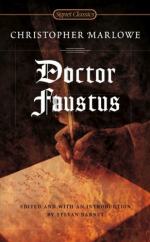|
This section contains 4,242 words (approx. 15 pages at 300 words per page) |

|
SOURCE: "God's Mercy Is Infinite: Faustus's Last Soliloquy," in English Studies, Vol. 64, No. 4, August, 1984, pp. 302-11.
In the essay below, Pittock argues that Faust is not doomed to damnation until a point during the course of his final soliloquy, underscoring the extraordinarily momentous nature of this scene in the tragedy. In the course of his discussion, Pittock counters commentators who have judged Faustus's final speech nonfunction in advancing the drama. because, they believe, Faustus lost his chance of salvation much earlier in the play.
In the course of a discussion of Dr Faustus in The Dramatist and the Received Idea (Cambridge, 1968), Wilbur Sanders expressed some dissatisfaction with what, for others, is Marlowe's supreme achievement: Faustus's last speech. For Sanders it is 'histrionic' (239), and he alleges that its 'oscillation between extremes—heaven and hell God and Lucifer ("Yet will I call on him. 0 spare me Lucifer")—is part of...
|
This section contains 4,242 words (approx. 15 pages at 300 words per page) |

|


